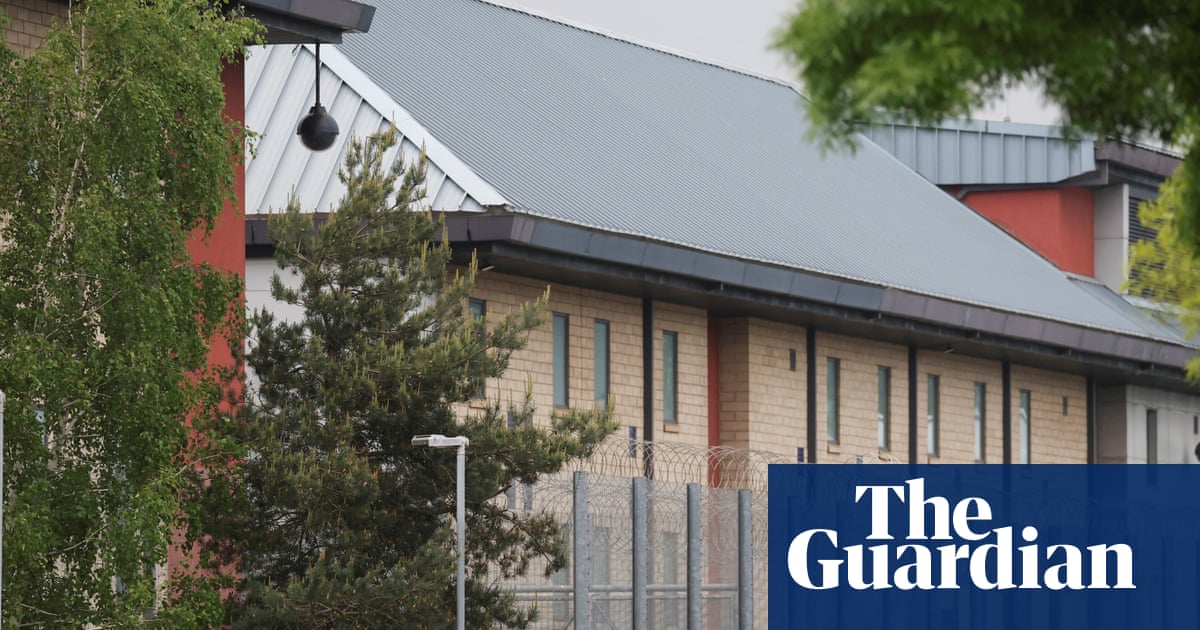
Police officers have been filmed carrying an asylum seeker against his will into a former army barracks site in Kent after he attempted to leave.
Hundreds of men have been locked in at Napier barracks, near Folkestone, following a significant coronavirus outbreak, despite reassurances from the government that the site is not a detention centre.
The Guardian understands that the man in the video attempted to leave the barracks on Wednesday morning by jumping the perimeter fence and demanded a transfer.
The video shows two officers carrying him by his hands and feet back through the gate into the barracks before dropping him to the floor.
The man is understood to have jumped the fence twice again, and was arrested after his third attempt.
Kent police said he was returned to the barracks for a “Covid breach” but legal experts have questioned their authority to do this.
A Kent police spokesperson said: “Kent police patrols were in the area of Napier barracks during the morning of Wednesday 3 February 2021 when they were made aware of a reported Covid breach. Officers attended and engaged with a man to explain and encourage him to follow government regulations and return to the site.
“He refused and officers were required to use reasonable force to physically return him safely back inside and no enforcement action was taken. The same male was then later seen again outside of the barracks and when officers engaged with him, he assaulted an officer and was arrested and taken into custody.
“Our officers will always engage with the public and ensure that people are aware of the current guidance and the need to stay safe.”
The man who filmed the incident, who asked not to be named, said: “He jumped the door and asked for a transfer. When they carried him back in he was shouting. It made me feel afraid. After he was brought back in, he jumped over again and the police took him away in a big car.”
The move to lock the camp came after at least 120 men tested positive for Covid-19 in mid-January.
Men were initially told to self-isolate in their housing blocks, which hold about 28, but many of those who tested positive continued to roam around the camp and take part in communal meals.
The Home Office then transferred some of the men who tested negative to hotels across the south-east of England to make self-isolation easier and told the remaining asylum seekers they would be reorganised into new bubbles.
The barracks is not a detention centre but “initial accommodation”, purportedly intended to hold men for a short time as they await a decision on their claims for asylum before they are moved on. The men were previously free to come and go from the site to access services in the community, but the gates have now been locked for two weeks.
There is a legal duty to self-isolate for those who receive positive tests and those who are contacted by NHS test and trace. Fines for those breaking the rule start at £1,000 and increase up to £10,000 for repeat offenders.
Adam Wagner, a human rights barrister at Doughty Street chambers, said: “This is very troubling footage. These are not detainees. I am dubious that there is a legal basis for the police using force.
“There is a power under the self-isolation regulations to use reasonable force to return somebody to the place that they’re supposed to be isolating but, as far as I know, people at the barracks were not given formal notifications to self-isolate and therefore there was no power of enforcement.
“In any case, I can’t see how the police can have known who was legally required to self-isolate and who was not. We do not know the full facts but it is possible the police have unlawfully assaulted this man.”
There has been an increased police presence at the site since Friday when a fire broke out in one of the housing blocks. Kent police has arrested 14 men in connection with the incident, one of whom was charged with assault.
The Home Office started housing asylum seekers at Napier barracks and a sister site at Penally barracks, in Pembrokeshire, in September. Ministers and officials have faced repeated warnings from humanitarian organisations and healthcare professionals over significant risks posed by Covid-19 at the sites, which have also been dogged by allegations of overcrowding and poor conditions.












